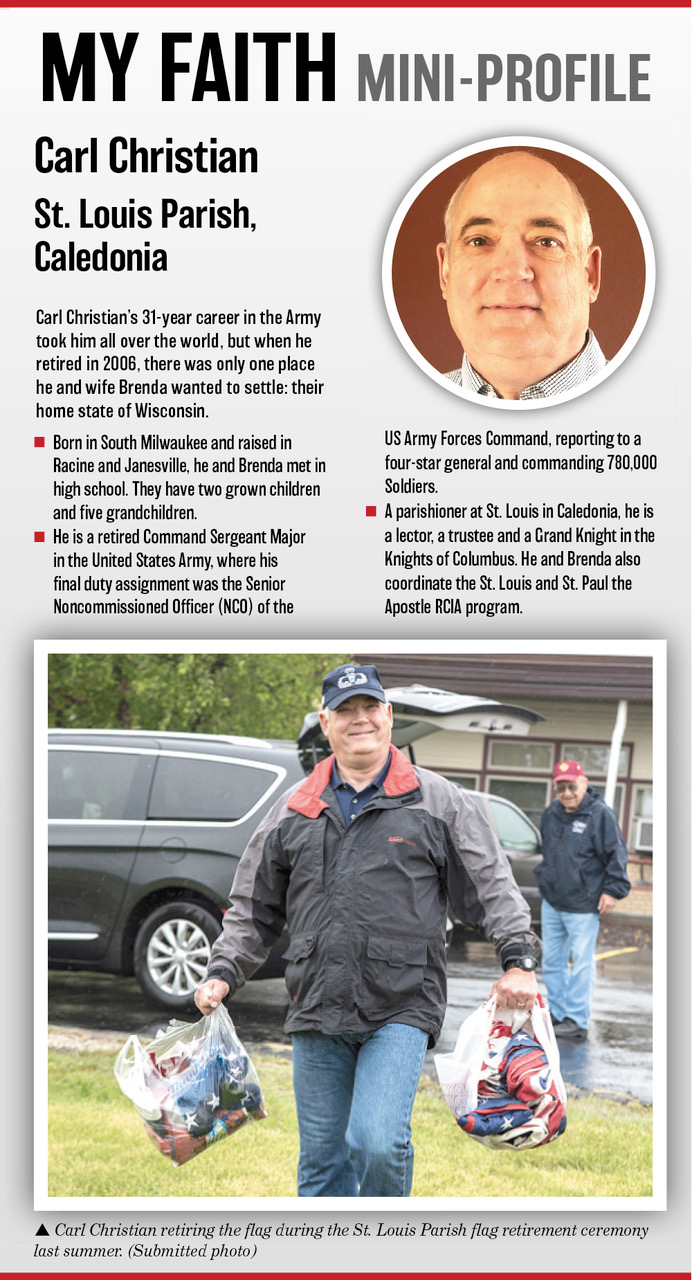COLLEEN JURKIEWICZ
CATHOLIC HERALD STAFF
You were the senior enlisted officer in the largest command in the Army. That’s a lot of pressure. Was it hard to be the guy who makes those tough decisions?
You learn to make challenging and difficult decisions but I used to tell the spouses, it’s harder not being deployed, like they are, then it is to be deployed in the worst situation I’ve ever been in. I do not know how they do it so well. You say your prayers when you’re the one going, but when it’s your troops going and you’re not able to be there, that’s a little bit of a deeper prayer. Every bad situation that happened, I got a report on my computer. Every individual we lost in Iraq and Afghanistan — I saw every single one of those reports. I read every one.
And it stays with you.
Absolutely. I can tell you the first casualty we took in the Gulf War. I was so mad; it was a situation that shouldn’t have happened. I remember after reading the report, getting up out of my desk, going to my general’s office and saying, “Sir, I need to get over there. This is something I should be there to fix.” And he just kind of stood up and put his hand on my shoulder and said, “Sergeant Major, this is not your fight.” And it was hard, because you want to be there. You want to fix it. But you can’t. You have to trust the ones you trained.
How did your faith help form your career in the Army, and how did your military career shape, in turn, your faith?
I had a lot of great leaders who taught me many great things, and even though they were military things, they’re the same things we’re taught when we listen to the readings in church on Sunday: have faith in each other and those above you, watch out for each other, take care of each other.
Can you share an example of those leadership skills?
When I was a squadron Sergeant Major, in charge of about 700 soldiers, I remember these guys had been screwing things up terrible. I gave the Sergeants a warning to get things fixed and they didn’t get fixed. So one afternoon, I told my Operations Sergeant to get all the NCO’s, find wherever you can fit them and put them all in one location. I wanted to see all 300 of them in one hour, I didn’t care what they were doing. They all knew they were gonna get their butts chewed. Where do you think the Operations Sergeant found a place for me to have this discussion with my NCO’s? It was the chapel. I walked to the front of this church and I had to start laughing. I said “Whoever chose this location, you all owe a beer to. You were about to get the worst butt-chewing I could muster up. But you put me in a place where I can’t use my foul language. So let’s just talk about it.” And it sounds funny, but in a lot of respects, being in the house of the Lord made me take a breath and talk to my troops — not talk at them, but to them, with them.
You and Brenda run the RCIA program at St. Paul the Apostle and St. Louis. Why do you hold RCIA meetings in your home?
We just feel candidates experience a more personal and family welcome to our faith. At first, these candidates come in, and they’re scared — they’re thinking, “Is this the right thing to do, I’m not sure about this, is everyone going to be judging me?” When we hold the RCIA meetings in our home, it doesn’t take long for them to warm up. We all gather around the table for class just like family does at meal time. And, the last class we have on the schedule is always a dinner. The spouses come, the children come, and Brenda puts on a big dinner for everybody.
